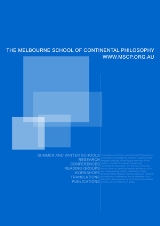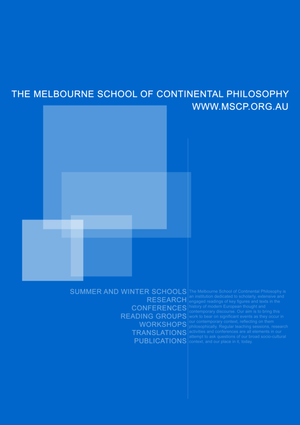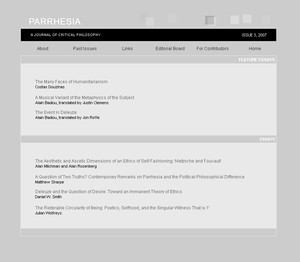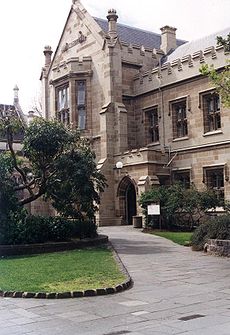
Melbourne School of Continental Philosophy
Encyclopedia

The Melbourne School of Continental Philosophy (MSCP) is an institution dedicated to scholarly, extensive and engaged readings of key figures and texts in the history of modern European thought and contemporary discourse. The School was founded in 2003 and formalised its status as an independent, not-for-profit organisation in 2004. It is based in Melbourne
Melbourne
Melbourne is the capital and most populous city in the state of Victoria, and the second most populous city in Australia. The Melbourne City Centre is the hub of the greater metropolitan area and the Census statistical division—of which "Melbourne" is the common name. As of June 2009, the greater...
, Australia
Australia
Australia , officially the Commonwealth of Australia, is a country in the Southern Hemisphere comprising the mainland of the Australian continent, the island of Tasmania, and numerous smaller islands in the Indian and Pacific Oceans. It is the world's sixth-largest country by total area...
and is housed by The University of Melbourne.
Formation and early years
In January 2002, Cameron Shingleton, Jon Roffe, Matt Sharpe and David Rathbone ran a summer school with four courses (on Nietzsche, on Deleuze, on Zizek and on Hegel, respectively) in the 1888 Building at the University of Melbourne. Sharpe had just finished his PhD on Zizek with Marion Tapper and Jon Rundell at Melbourne; Rathbone had returned to Melbourne from studies with Agnes Heller and Reiner Schurmann at the New School for Social Research in New York; Shingleton had completed his honors degree on Nietzsche in the German department; and Roffe his, in French. All four were of the opinion that the formalities of institutional academia alone were not sufficient to undertaking philosophical and critical thought. They thus formed the MSCP in the spirit of a guildGuild
A guild is an association of craftsmen in a particular trade. The earliest types of guild were formed as confraternities of workers. They were organized in a manner something between a trade union, a cartel, and a secret society...
of philosophers with the intention of preserving and fostering genuine intellectual engagement with continental philosophy. In 2003, they were joined by Sean Ryan, Craig Barrie, and Ashley Woodward, and later, Esther Anatolitis, Felicity Joseph, Jack Reynolds, Kate Noble, Alex Murray, Atliana Saffich, Mark Tomlinson, Marc Hiatt, James Garrett, Bryan Cooke, Paul Daniels, Andrea Leon-Martino, and Sherah Bloor, all of whom have all been involved in various ways during the five years 2004-2009, running annual Summer and Winter Schools, as well as several conferences and research days.
Summer and Winter Schools
The MSCP runs Summer and Winter Schools at the University of Melbourne during the university vacation breaks. Courses in the Schools consist of five two-hour lectures over a week and do not involve assessment or require any demonstrated prior knowledge of the topic in question. As the MSCP is a not-for-profit organisation, registration costs are minimal.MSCP courses seek a detailed and scholarly encounter with philosophical thinkers and themes. In particular, the courses attempt to promote constructive ways of engaging with philosophy which are not widely represented in contemporary academic discourse. The courses aim to locate philosophy in the context of its historical and cultural milieu, encouraging lively, academic debate, emphasising the interdisciplinary aspects of philosophy. Classes are informal but strive to be rigorous and faithful to the philosophers and texts being studied.
Past courses have covered philosophers such as Hegel, Nietzsche, Heidegger, Wittgenstein, Lyotard, Derrida, Deleuze and Badiou. A series of courses has run over several Summer and Winter Schools entitled 'MSCP History of Philosophy Series' which assessed philosophy from the pre-Socratics to modern empiricism. Similar courses, treating a theme rather than a particular philosopher or text, have included 'Three Centuries of Aphorism' and 'Democracy, Elites and Violence'.
Conferences
The MSCP has run conferences including:- 2002 Australasian Society of Continental Philosophy conference at the University of Melbourne (The MSCP hosted this conference in conjunction with the Department of Philosophy at the University of Melbourne), held in December 2002
- 'Immanuel Kant Today', commemorating the 200th anniversary of the death of Immanuel KantImmanuel KantImmanuel Kant was a German philosopher from Königsberg , researching, lecturing and writing on philosophy and anthropology at the end of the 18th Century Enlightenment....
, held in February 2004 - 'Sensorium', a conference on philosophy and aestheticsAestheticsAesthetics is a branch of philosophy dealing with the nature of beauty, art, and taste, and with the creation and appreciation of beauty. It is more scientifically defined as the study of sensory or sensori-emotional values, sometimes called judgments of sentiment and taste...
, held in June 2005 - 'Sartre Colloquium' which included a performance of Huis Clos (held in conjunction with the Department of French, Italian and Spanish Studies and the Department of Philosophy), held in October 2005
- '200 Years of Hegel's Phenomenology of SpiritPhenomenology of SpiritPhänomenologie des Geistes is one of G.W.F. Hegel's most important philosophical works. It is translated as The Phenomenology of Spirit or The Phenomenology of Mind due to the dual meaning in the German word Geist. The book's working title, which also appeared in the first edition, was Science of...
, held in July 2007
Research days
The MSCP has initiated a series of research days where philosophers in a particular field converge on a specific topic and workshop their papers together. So far, 'Spinoza and the Infinite', convened by Jon Roffe was held in December 2005 and was attended by Justin ClemensJustin Clemens
Justin Clemens is an Australian philosopher, translator, social critic, and poet. He is primarily known today for his work on Alain Badiou as an editor, translator, and scholar writing, speaking, and lecturing on the impact of Badiou's thought in this contemporary juncture.A former instructor in...
, Simon Duffy, Minna Koivuniemi and Jon Roffe.

Parrhesia Journal
Parrhesia is an international journal of Critical PhilosophyCritical philosophy
Attributed to Immanuel Kant, the critical philosophy movement sees the primary task of philosophy as criticism rather than justification of knowledge; criticism, for Kant, meant judging as to the possibilities of knowledge before advancing to knowledge itself...
affiliated with MSCP. It is edited by four MSCP members: Alex Murray, Matthew Sharpe, Jon Roffe and Ashley Woodward. It was launched in 2006 and has included articles by Alain Badiou
Alain Badiou
Alain Badiou is a French philosopher, professor at European Graduate School, formerly chair of Philosophy at the École Normale Supérieure . Along with Giorgio Agamben and Slavoj Žižek, Badiou is a prominent figure in an anti-postmodern strand of continental philosophy...
and Jacques Rancière
Jacques Rancière
Jacques Rancière is a French philosopher, Professor of Philosophy at European Graduate School in Saas-Fee and Emeritus Professor of Philosophy at the University of Paris Jacques Rancière (born Algiers, 1940) is a French philosopher, Professor of Philosophy at European Graduate School in Saas-Fee...
.
The title of the journal is a reference to Michel Foucault
Michel Foucault
Michel Foucault , born Paul-Michel Foucault , was a French philosopher, social theorist and historian of ideas...
and has shaped the character of journal submissions:
"Michel Foucault’s last works tell us that parrhesiaParrhesiaIn rhetoric, parrhesia is a figure of speech described as: to speak candidly or to ask forgiveness for so speaking. The term is borrowed from the Greek παρρησία meaning literally "to speak everything" and by extension "to speak freely," "to speak boldly," or "boldness." It implies not only...
is the act of fearlessly speaking the truth. To engage in parrhesia is never, however, a ‘neutral’ act. Parrhesia simultaneously incorporates aesthetic and ethical dimensions. The parrhesiast is someone whose fidelity to the truth becomes the pivot of a process of self-transformation."
In the spirit of Critical Philosophy, the editors of the journal aim "to gather a range of thinkers to examine the intersections between questions of subjectivity
Subjectivity
Subjectivity refers to the subject and his or her perspective, feelings, beliefs, and desires. In philosophy, the term is usually contrasted with objectivity.-Qualia:...
, politics
Politics
Politics is a process by which groups of people make collective decisions. The term is generally applied to the art or science of running governmental or state affairs, including behavior within civil governments, but also applies to institutions, fields, and special interest groups such as the...
, ethics
Ethics
Ethics, also known as moral philosophy, is a branch of philosophy that addresses questions about morality—that is, concepts such as good and evil, right and wrong, virtue and vice, justice and crime, etc.Major branches of ethics include:...
, aesthetics
Aesthetics
Aesthetics is a branch of philosophy dealing with the nature of beauty, art, and taste, and with the creation and appreciation of beauty. It is more scientifically defined as the study of sensory or sensori-emotional values, sometimes called judgments of sentiment and taste...
and truth
Truth
Truth has a variety of meanings, such as the state of being in accord with fact or reality. It can also mean having fidelity to an original or to a standard or ideal. In a common usage, it also means constancy or sincerity in action or character...
, intersections which both theoretically and practically form the critical points in our culture and in our time. As Walter Benjamin
Walter Benjamin
Walter Bendix Schönflies Benjamin was a German-Jewish intellectual, who functioned variously as a literary critic, philosopher, sociologist, translator, radio broadcaster and essayist...
suggests it is these ‘perilous critical moments’ upon which the very act of reading, writing and thinking must be based."
The current issue is Issue 3, 2007, and features an interview with Alain Badiou and an article by Friedrich Balke.
The MSCP and the University of Melbourne

One way in which the MSCP attempts to transcend its university boundaries is by seeking new ways to teach and engage with philosophy. In particular, MSCP events strive to be both informal and rigorous. With their courses offering no credit or assessment, students who attend are usually there for the joy of philosophy and seek to further their own intellects outside of a formal classroom setting. Being a not-for-profit organisation, the MSCP charges a minimum for its courses; again, this is aimed at transcending the current economic climate of university funding.
Membership
New members are typically recommended by current members and, largely because the organisation was founded by postgraduate students, they are usually honours year or postgraduate students themselves.External links
- MSCP - MSCP website
- Facebook - MSCP on Facebook including 'Discussions' blog
- Parrhesia - Parrhesia, an International Journal of Critical Philosophy
- School of Philosophy - School of Philosophy (previously Philosophy Department) at the University of Melbourne
- Australasian Nietzsche Society - run by MSCP members

